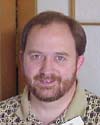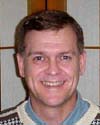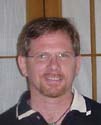|
|
IWS Alumni News |
| December 2004 |
Volume 1, Number 2 |
|
In This Issue W From the Editor: Second Edition Overview W Letter from Dr. Webber W Info Regarding Your IWS Email Address W Alumni Ministry Changes W Alumni Prayer List W Book Review: The Millennium Matrix W Alumni Seminar 2005
New Ancient-Future Release Bob's latest release in the Ancient-Future series is now available through Baker Books: Ancient-Future Time: Forming Spirituality Through the Christian Year. Baker Books, 2004.
Alumni Giving To make sure your gift is accurately recorded, remember to write your check to the IWS ALUMNI FUND. Be sure to include your class name [e.g., IWS ALUMNI FUND (Alpha Class)]. If you desire to designate your gift to a specific area, please indicate that also [e.g., IWS ALUMNI FUND—SCHOLARSHIPS (Alpha Class)].
Your
Profile
Changed ministries since IWS?
The Millennium Matrix:
Oral-Liturgical
”The Millennium Matrix is not a call to leave the past behind but to reclaim it and take its best gifts in reframing the future” (M. Rex Miller, The Millennium Matrix, 221).
Contact Information
Director
of Alumni Relations and Editor of IWS Alumni News |
The Second Edition of Alumni News Kent Walters, Director of Alumni Relations
First, let me say thank you to all of you who responded to the first edition of the IWS Alumni News. Your feedback and ideas were encouraging. Your ongoing response is an important part of keeping the IWS community alive.
Your IWS Email Address Everyone has been given an IWS email address, usually consisting of the first letter of your first name followed by your last name and attached to our domain name—iwsfla.org. (E.g., Jim Hart’s address: jhart@iwsfla.org). This IWS email address is redirected to your primary email address. (E.g., Jim’s primary email address is jckeahart@aol.com. A redirect causes any email sent to jhart@iwsfla.org to be “redirected” to jckeahart@aol.com). This way everything is automated and there is very little responsibility on your end.
During one of our class discussions in the early years of The Institute, one of my fellow Alphas spoke for nearly all of us when he said, “Bob, you’ve ruined my life!” Used by God, Dr. Webber and the IWS faculty had wisely synthesized, interpreted, and communicated ancient-future truth about worship that had profound impact on us all. We would never be the same. As Jesus explained, truth promises both life and death when fully embraced—
Chris Alford (DWS, Alpha 2002) serves as Minister of Music at Smithwood Baptist Church in Knoxville, Tennessee through December 19, after which time he will become the Minister of Music and Worship at Fair Oaks Presbyterian Church in Sacramento, California.
Chris writes: “The full reason for our leaving is as simple as this: Sheila and I believe God has clearly said that it’s time. We realized when we gave up our lives for service to God’s Kingdom that we were no longer our own—that our Sovereign could use and send us however and wherever He chose. The time has come.” (See the prayer request below).
Norm Brunelle (DWS, Alpha 2002) served for 11 years as Minister of Music at Trinity United Methodist Church in Opelika, Alabama. He is now Assistant Professor and Director of Outreach at Kentucky Christian University in Grayson, Kentucky where he supervises the Contemporary Worship major program, directs two touring vocal ensembles, and is developing a graduate program in worship arts.
Kenneth Rushing (DWS, Alpha 2002) previously served as Associate Pastor/Minister of Music & Administration at Shiloh Baptist Church, Plant City, Florida. He is now a Postulant for Holy Orders/Presbyterate at the Church of the Resurrection, Tampa, Florida.
Julie Smith (MWS, Aleph 2004) previously served as Director of Worship and Music at Saint Andrews Chapel in Sanford, Florida. She is now the Director of Music Ministries at St. John Lutheran Church, Cedar Falls, Iowa.
Alumni Prayer Requests
Eric Ohlmann and the accreditation process—Dr. Ohlmann writes: “Further
research into the accreditation process has shown that it takes longer than
the 2-3 years that had been initially expected.”
Book Review: The
Millennium Matrix
The Millennium Matrix: Reclaiming the Past, Reframing the Future of the
Church, M. Rex Miller. San Francisco: Jossey-Bass, 2004. Dr. Webber has asked the students to read this book for the January 2005 session. He is hoping the alumni will read it as well and will enter into dialogue regarding its contents. In
Part One, Miller outlines four eras of communication culture—oral, print,
broadcast, and digital—and critiques the various “mediums” of each era.
Miller suggests that for the church to be effective it must learn the new
culture and adapt both thinking and methodology in light of that new
culture. Old ways will not work effectively with new paradigms. For example,
he compares the use of print (linear) reasoning in the digital world to
“using a bulldozer to cultivate orchids” (5).
While Miller’s description of the oral culture is helpful, it seems somewhat
simplistic at certain points. For example, he equates the liturgical with
the oral (chapter 1). He jumps from pre to post fourth century without
really acknowledging the radical nature of Constantinian “reform”. These
fourth century developments dramatically affected church structure and
practice. And, whereas most would not consider the New Testament Church to
be “liturgical”, Miller includes all pre-print culture under that term. His
connection between word, truth, and person in oral culture is, however, very
helpful (23), noting that the relationship between truth, the truth giver
and community erode in the subsequent cultures of print and broadcast.
Describing the print culture, the author’s observations regarding shifts
from messenger to message, context to content and static replacement of the
living word are insightful. Many contemporary traditions, and virtually all
evangelical traditions, find their roots in print ideology. Miller helps us
understand that our epistemological “foundation” might be as much influenced
by the enlightenment as by scripture. We might be uncomfortable with the
statement “Print makes the message more important than the messenger” (48),
but it is very difficult to completely disagree with the point. Sola
scriptura traditions often identify the printed Bible as the definitive
authority. Earlier cultures did not experience this same kind of
compartmentalism.
Television is to the broadcast era what books were in the print era. The
press allowed truth to be captured on a page. Television allowed it to be
captured on a screen. However, the epistemological foundation remains highly
linear. The tendency to discard anything that was not individually and
personally validated was exacerbated in the broadcast era (56). While baby
boomers are often accused of historical amnesia, it may be the influence of
the transitory (television) rather than the desire of the generation.
Miller’s observations regarding the shifts from content to event, closure to
open-endedness, and left to right-brained thinking in the broadcast era
helpful. Many of our church traditions have been highly influenced by a kind
of modern broadcast ideology exemplified in “production” worship services
and big-event church architecture (73).
Today’s culture combines people rooted in print, broadcast and increasingly,
the digital. Miller contends that his own primary language is broadcast but
his children’s is digital (78). In many ways, the computer and internet are
to the digital what the television is to the broadcast. The difference is in
the level of potential interactivity. On one hand, there is a proliferation
of information, allowing for even more bypassing of oral sensibilities
regarding authority (80). On the other hand, there seems to be an interest
in connectivity. This connectivity is not motivated by the need for
“content” as it was in the oral era, but for community. Community, however,
is increasingly defined outside a traditional sense, e.g., the “virtual
community” (83) and virtual reality (87). “Digital cultures will continually
reach for the wisdom of the ages and seek to recontextualize it within their
community and setting” (87). The
fact that the church exists “right smack on the fault line between broadcast
and digital” (93) means that leaders must seek tremendous wisdom and
discernment. It is not simply a matter of moving ahead. Understanding and
embracing those who live and function in a print or broadcast paradigm is an
essential pastoral concern. Increasingly, connecting with the digital is a
missional concern.
Part Two of the book offers suggestions on how the church might respond to
changing eras. Questions about the value of numerical growth, which is
highly valued in the broadcast era, are raised. Further, six spiritual
hungers in the digital era are identified: hunger for home-grown prophets,
hunger to make a real difference, hunger for authenticity, hunger for
mystery, hunger for depth, and hunger for deep support (128-132). The holism
expected in the digital era will renew a sense of need for family, however
defined, and will require a renewed relational approach to leadership.
Miller offers keys for the church in the digital era: agility, transparency
and authenticity, cohesion and balance, resiliency and forgiveness,
sustainability, open-endedness (embracing change), accessibility and
collaboration (133-135). He also identifies essential qualities for
effective leadership (chapter 6), and helpful analysis regarding moral
reasoning in the digital era.
Overall, The Millennium Matrix is a very good analytical and futurist
offering. It is well worth the read. Seeing the contemporary (digital)
through the lens of the oral, print, and broadcast cultures will help church
leaders bring a sense of both unity and mission to a church that often seems
driven by trends and style.
Alumni Seminar 2005 Given your initial response in September, we are making plans for the second IWS Alumni Seminar this coming June. Since many of you asked, Bob Webber has agreed to teach this seminar. Here is an extraordinary opportunity to be inspired once again by Bob’s teaching, and to be influenced by his most recent research and vision for worship renewal. You are invited to participate in Commencement on Sunday, June 12 at 6:00 p.m. The alumni will don their regalia and process together. A reception follows the ceremony. You will also be able to join the IWS community in morning chapel worship and evening practicums.
We’re seeking to establish the right rhythm for these seminars—yearly or every other year—so scheduling this one is a bit of a test to determine your interest and needs. Please let me know if you are making plans (even tentatively) to come this June. Since Bob’s schedule is very busy during on-campus weeks it will be vital for him to know how to plan.
Mail your registration to IWS, ATTN: Jim Hart
|

 I
I
 after the rigors of "Webberian
Theology" (and that of the other faculty) it became clear that my
comfortable understanding, practice, leadership, and instruction of worship
were completely shot; there was no way that I could return to my previous
place of living. I had changed, and my ministry would have to change with
me; life as I knew it was ruined, and rightly so. I welcomed the ruin
knowing that my ministry at the church would have to be different. I realize
now that the difference was going to be realized in my eventual relocation”
(Norm Brunelle).
after the rigors of "Webberian
Theology" (and that of the other faculty) it became clear that my
comfortable understanding, practice, leadership, and instruction of worship
were completely shot; there was no way that I could return to my previous
place of living. I had changed, and my ministry would have to change with
me; life as I knew it was ruined, and rightly so. I welcomed the ruin
knowing that my ministry at the church would have to be different. I realize
now that the difference was going to be realized in my eventual relocation”
(Norm Brunelle). “I was uneasy about not
being able to continue my ministry where I was, but excited that the change
was brought about by divine intervention” (Ken Rushing).
“I was uneasy about not
being able to continue my ministry where I was, but excited that the change
was brought about by divine intervention” (Ken Rushing). Dale Dirksen (DWS, Gamma 2003) was kind enough to submit a thoughtful
review of the book. The following is an edited version of Dale’s review. You
may read the review in its entirety on the
Dale Dirksen (DWS, Gamma 2003) was kind enough to submit a thoughtful
review of the book. The following is an edited version of Dale’s review. You
may read the review in its entirety on the